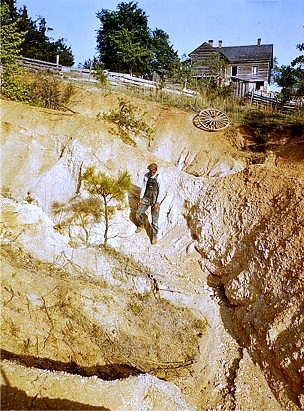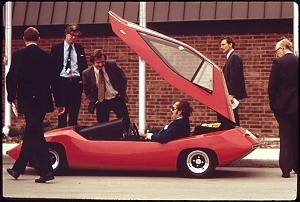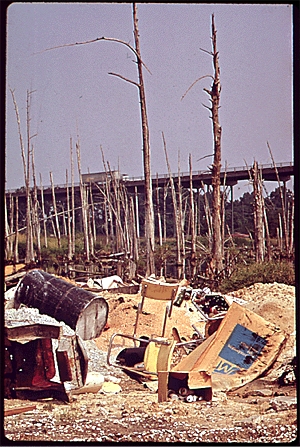Green History
Why
does a site on diversity in American history have a page on Green
History? Because environmental damage is no more democratic than the economic and political systems that create it. Pollution affects poor
Americans, people of color, and children disproportionately, from the location of landfills and hazardous waste dumps to the intensity of clean-up efforts--or lack thereof--in diverse neighborhods. Also, our
site is dedicated to telling the untold stories of American history,
and environmental history is full of them. Finally, we believe this stuff is important. Really important.
As
Professor Bill
Kovarik put it so beautifully: "A broad lack of historical perspective
about green crusaders and environmental events has its origins in both
neglect and misinformation. This lack of perspective isbecoming more
obvious as environmental protection becomes an increasingly important
part of the global social fabric. Issues often emerge in the mass media
without context and then disappear with little more than symbolic
resolution. Political conservatives seem not to recognize the
reflection of their own values in conservation movements. Political
liberals lack a sense of the traditions of social reform."
The sites below range from
middle school to professional level. On them you will find information to
educate, inform, and inspire. If you have any suggestions of sites to
add, we'd love it if you'd email us at info@onehistory.org.
Environmental History
Timeline
Professor
Bill
Kovarik's site is just what it says it is, only more. This site
presents a detailed and interesting timeline of environmental
issues and activists from ancient times through the present. As the
site states: "Environmental issues have surfaced throughout human
history. The evidence is in
manuscripts, publications and historical
archives, but it is often found under labels like public health,
conservation, preservation of nature, smoke abatement, municipal
housekeeping, occupational disease, air pollution and water pollution."
A Brief History of Environmentalism
This document by Andy Reynolds is a short narrative history of
environmentalism from the 1840s through the modern era.
A History of the
American Environmental Movement
This site from ectopia.org is a timeline that covers environmentalism
in the United States from the 1840s through the present. Ectopia has
also created an Ecology
Hall of Fame which contains
biographies, excerpts, and more on major figures in American
environmentalism.
Environmental
Ethics
For those who are of a more intellectual and philosophical bent, this
site, created by the Center for Environmental Philosophy at the
University of North Texas, offers a brief history of environmental
ethics beginning in the 1970s.
Periods
and Events in the Emergence of American Environmentalism
A detailed outline written by Associate Professor Gene Myers, Huxley College of the Environment at Western
Washington University, includes events and individuals connected
to the development of environmentalism in the United States.
Meyers starts in the English colonial period and highlights European
philosophical sources as well.
Conservation,
Preservation, and Environmental Activism: A Survey of the Historical
Literature
This page--part of the National Park Service web site--offers an
excellent overview and an incredibly wide-ranging annotated
bibliography including books that cover subjects such as "The
Conservation Movement," "Nature and American Culture," "The
Environmental Movement" and "The First Anti-Pollution Campaigns."
The Center
for Environmental Justice
has a very short page on its site: History of
Black Environmentalism. It also has a very short page: A Selection of
African-American Environmental Heroes. Both of these pages are good
a beginning that just points to the need for more scholarship in the area
of multicultural involvement in environmentalism.
The
Pristine Myth: The Landscape of the Americas in 1492
This paper by William M. Denevan, Department of Geography, University
of Wisconsin, offers a fascinating challenge to the perception that
North America was a "pristine, untouched wilderness" prior to the
encroachment of the Europeans. This paper is college level and requires
careful reading. There are also a number of translation glitches and/or
typos that make careful reading an essential requirement.
Nature
Transformed: The Environment in American HIstory
A National Humanities Center site which offers essays by scholars on
subjects such as "Native Americans and the Land," "Wilderness
and American Identity," and "The Use of the Land."
Articles and Papers
"Blacks, Whites share concerns about
environment" (Black Issues in Higher Education, July 17, 2003)
Reviews the study, "Dispelling Old Myths: African American
Concern for the Environment," written by Dr. Paul Mohai, associate
professor at the University of Michigan's School of Natural Resources
and Environment, which was cover story for the June 2003 issue of Environment magazine.
"The First
Environmentalists"
This well-written article by Mindy Pennybacker--published in The Nation, January 20,
2000--examines Winona LaDuke's All
Our Relations and the disproportionate amount of environmental
degradation occurring on American Indian reservations. It also
explores, briefly, The Ecological
Indian, by Shepard Krech III and the debate over whether first
Americans were natural environmentals, or not.
"Wilderness,
Race, and African Americans: An Environmental History from Slavery to
Jim Crow"
This thesis paper by Michael Starkey was submitted to
filfill an M.A. dregree for the Energy and Resources Group at the
University of California, Berkeley.
Books
Environmentalism: A
Global History by Ramachandra
Guha, Prentice Hall (2000)
The first genuinely global history of environmentalism and written by
one of the foremost thinkers on ecological issues relating to South
Africa. Ramachandra Guha has become one of the more provocative and
perceptive commentators on environmentalism in its cross-cultural and
global dimensions. College level students will find this new text to be
a lively and engaging study of ideas and debates that are central to
our lives in the twentieth-first century.
Natural Protest: Essays on the History of
American Environmentalism, edited by Michael Egan and Jeff
Crane, Routledge, (2008)
From Jamestown to 9/11, concerns about the landscape, husbanding of
natural resources, and the health of our environment have been
important to the American way of life. Natural Protest is the first
collection of original essays to offer a cohesive social and political
examination of environmental awareness, activism, and justice
throughout American history. Editors Michael Egan and Jeff Crane have
selected the finest new scholarship in the field, establishing this
complex and fascinating subject firmly at the forefront of American
historical study.
Major Problems in American Environmental
History, 2nd edition, edited by Carolyn Merchant and Thomas
Paterson, Wadsworth Publishing (2006).
This volume traces the history of environmental conditions in the
United States through the examination of critical issues such as
pollution, conservation, and wilderness preservation. The Second
Edition of this popular text includes several new essays and documents
and pays particular attention to multiculturalism and gender
throughout. In order to place American environmental issues in a larger
context, the text emphasizes international relations and globalization.
Women Pioneers for the Environment by Mary Joy Breton, University
Press of New England (1998)
Inspiring stories of more than forty remarkable women from across the
globe, each of whom stepped out of her traditional role and dedicated
her life to saving the planet.
To
Love the Wind and the Rain: African Americans and Environmental History, edited by Dianne D. Glave and
Mark Stoll, University of Pittsburgh Press, 2005.
"Will help set the course for emerging African American environmental
historical scholarship. This collection of essays will enhance not only
the existing but also future environmental histriography by including
the added and much needed perspectives of race and gender." --Journal
of American Ethnic History
African
American Environmental Thought: Foundations (American Political Thought),
by Kimberly K. Smith, University Press of Kansas, 2007.
Beginning with environmental critiques of slave agriculture in the
early nineteenth century and evolving through critical engagements with
scientific racism, artistic primitivism, pragmatism, and
twentieth-century urban reform, Smith highlights the continuity of
twentieth-century black politics with earlier efforts by slaves and
freedmen to possess the land. She examines the works of such canonical
figures as Frederick Douglass, Booker T. Washington, W. E. B. Du Bois,
and Alain Locke, all of whom wrote forcefully about how slavery and
racial oppression affected black Americans' relationship to the
environment. --book description
An
Environmental History of Latin America (New Approaches to the Americas)
, by Shawn William Miller, Cambridge University Press, 2007.
This book narrates the mutually mortal historical contest between
humans and nature in Latin America. Covering a period that begins with
Amerindian civilizations and concludes in the region's present urban
agglomerations, the work offers an original synthesis of the current
scholarship on Latin America's environmental history and argues that
tropical nature played a central role in shaping the region's
historical development. Seeing Latin America's environmental past from
the perspective of many centuries illustrates that human civilizations,
ancient and modern, have been simultaneously more powerful and more
vulnerable than previously thought. --book description
"For years to come, studies of Latin American environmental history
will have to begin with references to Shawn Miller's book." - Alfred W.
Crosby, Professor Emeritus of American Studies, History, and Geography,
University of Texas at Austin
See books on other
subjects on our Books
pages.
Images
The Farm
Security Administration photographs at the Library of Congress
The Farm Security Administration (FSA) collection is
justly
famous for its images of Americans struggling through the Depression.
Less famous but also important are the photographs of the devastation
of the land. Type in the word "erosion" and find images from
Mississippi to Illinois to California. Type
in "Conservation" and look through the 607 images that come up. All the
images are in the public domain. Excellent download quality. There is
also a musch smaller FSA
Color Photograph collection that might appeal to students who
aren't used to seeing the world in black and white.
National
Archives and
Records Administration
In the 1970s the
Environmental Protection Agency sent photographers all over the United
States to take photographs of pollution and its effects. The
collection, "DOCUMERICA: The Environmental Protection Agency's Program
to Photographically Document Subjects of Environmental Concern,
compiled 1972 - 1977," is similar in
scope if not quality to the FSA photograph collection, these
EPA photographs are an
underutilized treasure. The National Archives search engine is called
ARC and you can get very detailed in what types of searches you want to
do. However, the site can be a bit glitchy, so be careful. All
Archives images are in the public domain. Excellent download quality.



